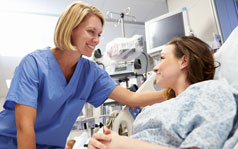Colonoscopy
Contact Us
Please note that a referral letter is required before an appointment can be confirmed.
Please note that a referral letter is required before an appointment can be confirmed.
Useful Information
About our services
Colonoscopy is used to detect issues such as inflamed tissue, ulcers, and abnormal growths. The procedure is used to diagnose unexplained changes in bowel habits, abdominal pain, bleeding from the colon, and weight loss, which can be an indicator of many illnesses and diseases. You will either have a full colonoscopy or left-sided colonoscopy.
Full colonoscopy
A full colonoscopy is a visual examination of the lining of your bowel. It is performed by passing a small flexible tube through the back passage (anus) into the colon, which has a camera and a light on the tip, used to look at the area being examined. To allow a clear view during the examination, your bowel (colon) must be empty. You will be given instructions about taking laxative solutions/preparation(s) to clear the bowel, in advance of the test.
The test itself varies in length lasting from 15-60 minutes. However, you can expect to be here for your appointment for a couple of hours as you will need time following the procedure to recover from the sedation.
Left sided colonoscopy
A left sided colonoscopy is similar to a full colonoscopy, but it only examines the lower part of the large intestine, the rectum and the sigmoid colon. It is performed by passing a small flexible tube through the rectum into the lower left side of the colon.
What to expect
Before the procedure, you will be prescribed and given an enema, to clear your bowel. A nurse will take you through what to expect and once it has worked, you will be taken into the procedure room where your test will be completed. You do not need to fast for this procedure. The test itself is quite short, lasting approximately five to ten minutes. However, you can expect to be in the department for a couple of hours – this depends on the whether or not you have sedation.
- You will receive sedation for the procedure. You must not travel home unaccompanied or drive.
- You will lie on your left side and the examination will be carried out.
- The tube with be inserted and moved through the large intestine to carry out the examination.
- During the test air or CO2 will be passed into your colon to inflate the area to give a better view.
- If necessary, the doctor may take a small piece of tissue for biopsy.
- You may feel some abdominal (stomach) cramps and some pressure from the tube. This is normal and will pass quickly.
- A nurse will stay with you throughout the examination.
This test is not normally performed under sedation, but if required, we will discuss this with you:
- You will lie on your left side and the examination will be carried out.
- The tube with be inserted and passed through the area to be examined. During the test, air will be passed into your colon to inflate the area to give a better view.
- If necessary, the doctor may take a small piece of tissue for biopsy.
- You may feel some abdominal (stomach) cramps and some pressure from the tube. This is normal and will pass quickly.
- A nurse will stay with you throughout the examination.
Frequently asked questions
A nurse will be with you throughout the procedure, if you feel any discomfort or are concerned at any point. There may be some discomfort or cramping from the air used to inflate the bowel, but this will pass quickly.
Colonoscopy examinations can detect issues such as inflamed tissue, ulcers, and abnormal growths, to help in the diagnosis of unexplained changes in bowel habits, abdominal pain, bleeding from the colon, and weight loss, which can be an indicator of many illnesses and diseases (for example polyps, haemorrhoids, diverticulosis, benign or cancerous growths).
It will take your bowels at least two days to return to normal and your bowel motions may be blood stained.
You will be advised when to resume eating prior to your discharge. Usually, you return to normal eating following discharge, though something light might be easier the first day.







.jpg?sfvrsn=3587ad64_1)


